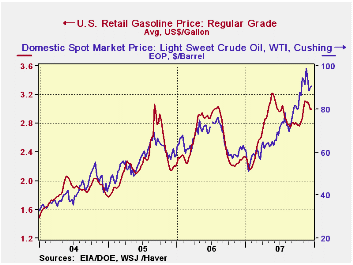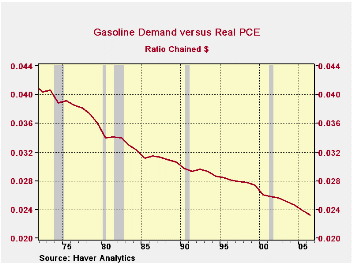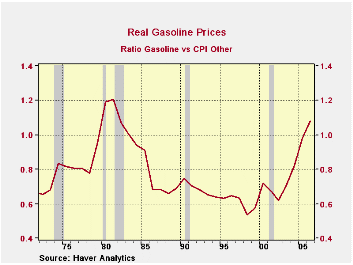 Global| Dec 19 2007
Global| Dec 19 2007Gasoline Still Near $3.00 per Gallon. Longer Term, Less is Used
by:Tom Moeller
|in:Economy in Brief
Summary
On average, retail gasoline prices last week held at the prior period's level of $3.00 per gallon, according to the US Department of Energy survey.That level is, however, down eleven cents from the peak one month ago. The recent [...]

On average, retail gasoline prices last week held at the prior period's level of $3.00 per gallon, according to the US Department of Energy survey.That level is, however, down eleven cents from the peak one month ago.
The recent stability of gasoline prices owes to the decline in the price of crude oil. For spot WTI crude oil, prices at $90.00 per barrel are down almost 10% from the highs last month which nearly touched $100 per barrel.
That stability, however, is little comfort at the pump where prices have doubled versus the $1.56 averaged during 2003. To drive 10,000 miles in a vehicle which averages 20 miles per gallon, the annual cost has risen to $1,500 from $750.
At the margin, where spending decisions are made, persons earning $30,000 per year now will now spend 5% of yearly income on gasoline versus 2.5% in 2003. Since then the demand for gasoline indeed has fallen, but only modestly to 2.3% of real consumer expenditures from 2.5%. Bottom line: less will be available for spending on other goods & services.
Longer term trends paint a somewhat less gloomy picture for two reasons. 1) As a percentage of total consumer spending, that percentage spent on gasoline is down by nearly one half since before oil prices quadrupled in the mid 1970s, and 2) versus all other consumer prices gasoline has risen sharply, yet only to the level of the early 1980s.
Less demand for gasoline only is perhaps a saving grace for this picture. Had vehicle fuel efficiency not roughly doubled to that 20 miles per gallon, annual fuel costs would be $3,000. Ouch. That's still a doubling.
Relative to all other consumer prices, gasoline indeed has risen. Ouch. In fact, the rise rivals the gain of 25-30 years ago. A saving grace, perhaps; the level prices have risen to is still below the high seen in 1980. (That's only a positive if a person was born before 1963.)
Other factors also do mitigate the negative effects of the recent rise in gasoline prices. Disposable income growth is now accelerating versus decelerating in earlier periods of oil price shocks. And even though employment growth is recently down, the deceleration is nowhere near as dramatic as in earlier periods. And the unemployment rate is lower. Finally, interest rates are quite a bit lower.
That all, makes it quite uncertain how consumer will/is holding up. The data are inconclusive, so far. Anecdotal reports are mixed. Chain store sales are easing. Vehicle sales are flat to lower. (All of the data used in this analysis is available in Haver's USECON and USWEEKLY data bases.)
Oil Shocks and Price Stability from the Federal Reserve Bank of St. Louis is available here.
Today's announcement by the Fed of recent auction result can be found here.
| Weekly Prices | 12/17/07 | 12/10/07 | Y/Y | 2006 | 2005 | 2004 |
|---|---|---|---|---|---|---|
| Retail Gasoline ($ per Gallon) | 3.00 | 3.00 | 29.2% | 2.57 | 2.27 | 1.85 |
| Light Sweet Crude Oil, WTI ($ per bbl.) | 90.03 | 88.33 | 47.5% | 61.11 | 58.16 | 41.78 |
Tom Moeller
AuthorMore in Author Profile »Prior to joining Haver Analytics in 2000, Mr. Moeller worked as the Economist at Chancellor Capital Management from 1985 to 1999. There, he developed comprehensive economic forecasts and interpreted economic data for equity and fixed income portfolio managers. Also at Chancellor, Mr. Moeller worked as an equity analyst and was responsible for researching and rating companies in the economically sensitive automobile and housing industries for investment in Chancellor’s equity portfolio. Prior to joining Chancellor, Mr. Moeller was an Economist at Citibank from 1979 to 1984. He also analyzed pricing behavior in the metals industry for the Council on Wage and Price Stability in Washington, D.C. In 1999, Mr. Moeller received the award for most accurate forecast from the Forecasters' Club of New York. From 1990 to 1992 he was President of the New York Association for Business Economists. Mr. Moeller earned an M.B.A. in Finance from Fordham University, where he graduated in 1987. He holds a Bachelor of Arts in Economics from George Washington University.
More Economy in Brief
 Global| Feb 05 2026
Global| Feb 05 2026Charts of the Week: Balanced Policy, Resilient Data and AI Narratives
by:Andrew Cates






